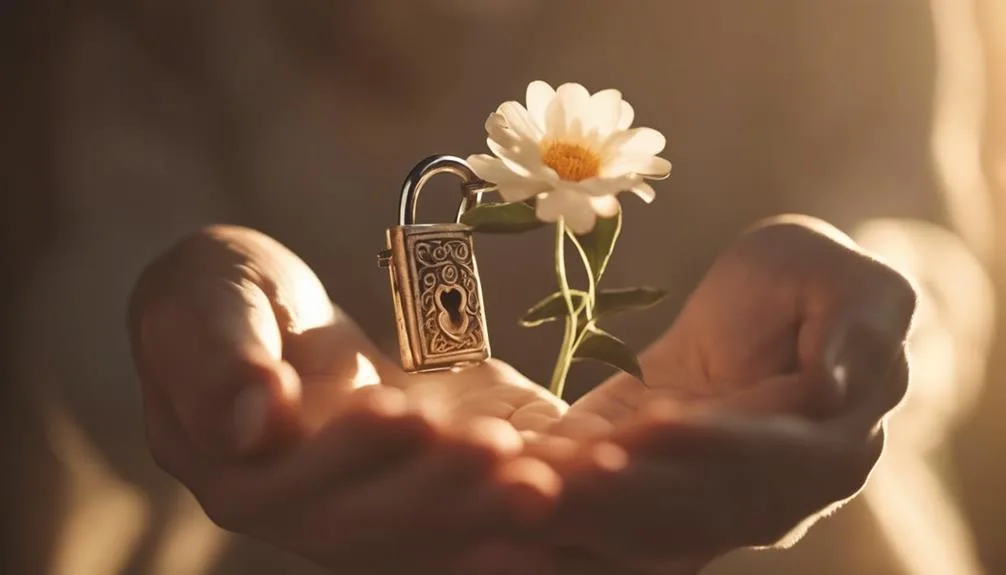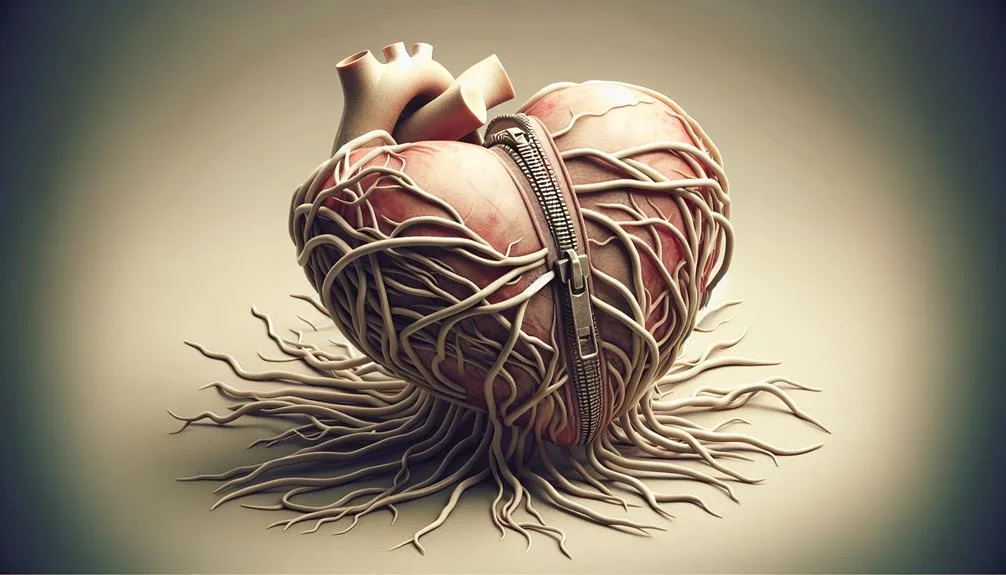You might not realize that the fear of intimacy can often trace back to how you played as a child. In those early years, the type of play and interaction you engaged in laid the groundwork for how you connect with others today.
If you've ever found yourself pulling away in a relationship or erecting barriers when things get too close for comfort, it's worth exploring these childhood dynamics. This journey into your past isn't about assigning blame but understanding patterns that can unlock the door to deeper, more fulfilling connections.
Curiosity about these early experiences could be the key to navigating the complexities of intimacy with more ease and awareness.
Key Takeaways
- Attachment styles from early childhood can influence fear of intimacy in adulthood.
- Emotional trauma, such as past heartbreak, contributes to the development of intimacy fears.
- The absence of positive intimacy role models can hinder the understanding and practice of healthy relationships.
- Low self-worth or feelings of inadequacy are significant barriers to embracing vulnerability and intimacy.
Understanding Attachment Styles
Diving into the concept of attachment styles reveals how early interactions with primary caregivers shape our approach to relationships and intimacy. Exploring caregiver dynamics uncovers that our earliest bonds influence whether we feel secure or anxious in later connections.
Attachment theory nuances suggest that these patterns, established in infancy, dictate our comfort levels with depending on others. If you've noticed a tendency towards independence to the point of isolation, or perhaps an excessive need for reassurance, these behaviors can be traced back to your initial familial relationships.
Understanding these dynamics offers a lens through which to view your relational behaviors, providing insights into why you might push closeness away or cling too tightly. It's a critical step in acknowledging and addressing fears of intimacy.
Emotional Trauma's Role
Understanding your attachment style offers a foundation, but it's also crucial to recognize how past emotional trauma can shape your fear of intimacy. Emotional healing plays a pivotal role in your healing journey, allowing you to address and work through the fears holding you back.
| Emotional Trauma | Impact on Intimacy |
|---|---|
| Past Heartbreak | Hesitancy to Trust |
| Childhood Neglect | Fear of Abandonment |
| Emotional Abuse | Low Self-Esteem |
| Loss of a Loved One | Withdrawal from Connections |
| Witnessing Unhealthy Relationships | Misconceptions About Love |
Your emotional healing journey is unique, filled with challenges and triumphs. Embracing this path can gradually dissolve the barriers to intimacy, fostering a deeper connection with yourself and others. Remember, healing is not linear, and every step forward is a victory in your journey towards overcoming the fear of intimacy.
The Impact of Role Models

Reflecting on the influence of role models, it's clear that witnessing healthy relationships can significantly shape your comfort with intimacy. When you observe role models who embody healthy boundaries and effective communication skills, you're not just seeing a relationship in action; you're witnessing a blueprint for emotional connection and respect. These role models provide a living example of how to navigate the complexities of closeness with others, teaching you, perhaps unconsciously, how to establish your boundaries and communicate your needs and feelings.
This exposure is invaluable. It equips you with the tools necessary to foster your intimacy skills, emphasizing that maintaining individuality while cultivating closeness isn't only possible but essential. Understanding this balance is a foundational step towards overcoming fear of intimacy.
Self-Worth and Vulnerability
At the heart of overcoming fear of intimacy, one's sense of self-worth and ability to be vulnerable play pivotal roles.
Your journey to enhancing intimacy involves:
- Self-reflection to understand your fears and acknowledge your worth.
- Self-acceptance to embrace your imperfections and recognize your value.
- Vulnerability to open up, share your true self, and grow.
Strategies for Overcoming Fear

To effectively tackle the fear of intimacy, it's crucial to implement practical strategies that address the root causes of this fear while fostering emotional resilience. Building trust is foundational; it starts with understanding your own vulnerabilities and extends to carefully choosing whom to trust with those vulnerabilities. This process isn't overnight—it demands patience and consistent effort.
Emotional healing, on the other hand, requires confronting past traumas that may be influencing your fear of intimacy. It involves acknowledging your pain, understanding its impact on your current behaviors, and actively working towards healing, often with professional support. Both building trust and emotional healing are intertwined, each reinforcing the other.
As you develop trust in yourself and others, you pave the way for deeper emotional healing, gradually overcoming the fear that once held you back.
The Path to Intimacy Recovery
Embarking on the journey toward intimacy recovery, you'll find that understanding the psychological roots of your fear is the first crucial step. Your healing journey isn't just about confronting these fears; it's also about building a new foundation of trust within yourself and with others.
Here are three key strategies to consider:
- Self-reflection and Acceptance: Acknowledge your past and its impact on your present feelings toward intimacy.
- Trust Building Exercises: Start small with friends or a therapist to gradually increase your comfort level with vulnerability.
- Communication Skills: Learn to express your needs and fears in relationships, fostering a deeper connection and mutual understanding.
Frequently Asked Questions
How Can Cultural Differences Impact One's Fear of Intimacy and Their Approach to Overcoming It?
Cultural norms and communication barriers can deepen your fear of intimacy, making it hard to connect. By understanding these differences, you'll find pathways to bridge gaps, enhancing your approach to overcoming these fears.
Can a Fear of Intimacy Be Inherited or Is It Solely Developed Through Personal Experiences?
You might wonder if fear of intimacy is inherited or stems from your experiences. While genetic predispositions play a role, attachment theories suggest your early interactions significantly shape your comfort with intimacy.
How Does the Fear of Intimacy Affect Sexual Orientation and Relationships Within the Lgbtq+ Community Differently?
Fear of intimacy can uniquely challenge LGBTQ+ relationships, impacting identity validation and requiring emotional resilience. It's crucial to navigate these fears with empathy, understanding their roots to foster stronger, more authentic connections.
In What Ways Can Technology and Social Media Usage Exacerbate a Fear of Intimacy?
Your screen glows, a window to worlds unknown, yet it deepens your solitude. Excessive social media use and digital detox failures erode privacy, amplifying fears of intimacy. Understanding these patterns can foster closer connections.
Are There Any Specific Physiological Responses or Health Conditions That Can Arise as a Result of a Long-Standing Fear of Intimacy?
Yes, a long-standing fear of intimacy can trigger stress-related health conditions. Understanding attachment theory and practicing stress management can significantly help. It's about recognizing patterns and working towards healthier relationships and emotional well-being.
Conclusion
Unraveling the roots of your fear in intimacy isn't a walk in the park, but it's a journey worth taking. By understanding your attachment style, addressing past traumas, evaluating the impact of role models, and embracing your worth, you're laying the groundwork for overcoming these fears.
Remember, vulnerability is the key to unlocking deep connections. With courage and determination, you can turn the tide, transforming fear into the foundation for meaningful, intimate relationships. The path ahead is challenging, yet profoundly rewarding.

